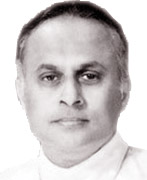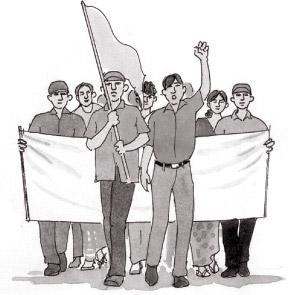Civil Rights and sincerity
 In the last column in this series, I will look at the Civil Rights
Movement, which was founded in 1971. In discussing its contribution to
Rights, and the manner in which Rights can be most productively
promoted, I will also talk about one of its founding members, Bishop
Lakshman Wickremesinghe, whose 86th birthday it would have been today. In the last column in this series, I will look at the Civil Rights
Movement, which was founded in 1971. In discussing its contribution to
Rights, and the manner in which Rights can be most productively
promoted, I will also talk about one of its founding members, Bishop
Lakshman Wickremesinghe, whose 86th birthday it would have been today.
Like his father, Cyril Wickremesinghe, who was the first Ceylonese
Government Agent, he was a radical in his commitment to social equity.
At least, I like to think this was his father’s essential approach,
though he was also a pillar of the establishment, a great friend of D S
Senanayake and D R Wijewardene, whose eldest daughter married his eldest
son. But, like DS, much of his working life was spent providing better
opportunities to the peasantry, through the opening up of agricultural
lands in the North Central Province.
Great visionary
Lakshman, as Bishop of Kurunegala, worked in what was seen as the
rural diocese of the Church of Ceylon, and followed in the footsteps of
another great visionary, Bishop Lakdasa de Mel. Both of them, unlike
some of their elite brethren in Colombo, worked closely with the
Buddhist clergy.
|

Bishop Lakshman Wickremesinghe |
This included the politically radical clergy, and the founders of CRM
included five monks as well as four Christian priests, including Leo
Nanayakkara, the Catholic Bishop of Kandy. The founder Chairman was Prof
Sarachchandra, whose sympathies, like those of Bishop Lakshman, were
with the SLFP, but who also felt that the reaction to the 1971
insurgency had been too harsh.
In its opening statement of aims, CRM said its immediate task related
to restoration of ‘certain rights and liberties that have recently been
suspended’. As we know from the reaction to 9/11 as well as in our own
country, threats to the State lead to strong security measures. These
are essential to deal with threats, but often they become an end in
themselves and, unless they are subject to limitations and strict
systems of oversight, they easily lead to repression that is
unwarranted.
Dealing effectively with this, without threatening or even seeming to
threaten national security, requires a clear objectivity of purpose.
That is why it is important that supporters of government also subscribe
to organizations such as CRM, and in asserting fundamental principles
also try to understand the perspectives of those who see no harm in
violating these. While many practitioners of violations have no regard
for the principles, we must also recognize the genuine dilemma of those
who have to lay down guidelines – and we need to show that violations
can ultimately defeat the purpose in that they generate the state of
anarchy that needs to be protected against.
Freedom of expression
The first problem to which CRM drew attention was the erosion of the
right to freedom of expression and dissemination of information. That
was a real problem in those days, when there were few media outlets and
these all belonged to government or to corporate institutions with their
own agendas. Given the preponderance of social media now, freedom of
information is not such a problem, but we still have to deal with
threats to individual journalists, because of the emotions of those they
criticize. Again, the best defence against this, apart from swift
investigation and a transparent judicial process, is clarity about how
such threats in fact rebound on the perpetrators.

CRM then went on to talk about the rights of persons taken into
custody, and the need to revoke the emergency regulations that permitted
the disposal of dead bodies without inquests. These are areas which are
still of concern, and perhaps the more so given the change in the
international code of values, following 9/11. What hardy Cold Warriors
did in secret is now justified on the grounds of national security, even
by leaders who should know better. And the problem is compounded
everywhere by the appalling conditions of prisons, and the absence of
regular monitoring by the judiciary and other bodies that should be
objective.
CRM’s final point was the restoration of full trade union rights, a
matter that was dear to Lakshman’s heart, as was seen in his advocacy of
the rights of those thrown out of work after the July 1980 strike, when
the Jayewardene government first made clear its authoritarian outlook.
By then Lakshman was Chairman of the Civil Rights Movement, which
brought him into constant argument with his elder brother Esmond, who
was a pillar of the government.
National leader
Lakshman’s finest hour however was also his last, when he made
valiant efforts at Reconciliation after the 1983 July riots. He had been
in England when these took place, having taken a year’s sabbatical, to
write and also to recover from his first heart attack. I had a few words
with him when I got there myself, and advised him to take things slow,
and he assured me his doctors had made it clear that this was essential.
But the situation was so bad that he did not rest, from the moment he
got back. He was the first national leader to go to Jaffna, and he
provided comfort along with detailed analysis of what the nation was
doing to itself. He had, from the time Esmond’s great friend Cyril
Mathew unleashed violence against Tamils in the early days of the
Jayewardene government, told Esmond that they were provoking disaster.
Even I had thought he was exaggerating, but it was clear by 1983 that he
had underestimated the mayhem that was being let loose.
He had had another heart attack by the time I got back and, though he
asked to see me, his mother thought it best that I should wait until he
was better. But he died, three months after the riots began, and I fear
that with his death, objective advocacy was immeasurably weakened. CRM
continues, a pale shadow of what it was. Its sincerity should be
supported, but that seems no longer at a premium. |







